There’s still so much work left for us to do, warns granddaughter of rebel suffragette
Bee Rowlatt talks to Helen Pankhurst on a campaign to finally open up politics
Friday, 10th March 2023 — By Bee Rowlatt
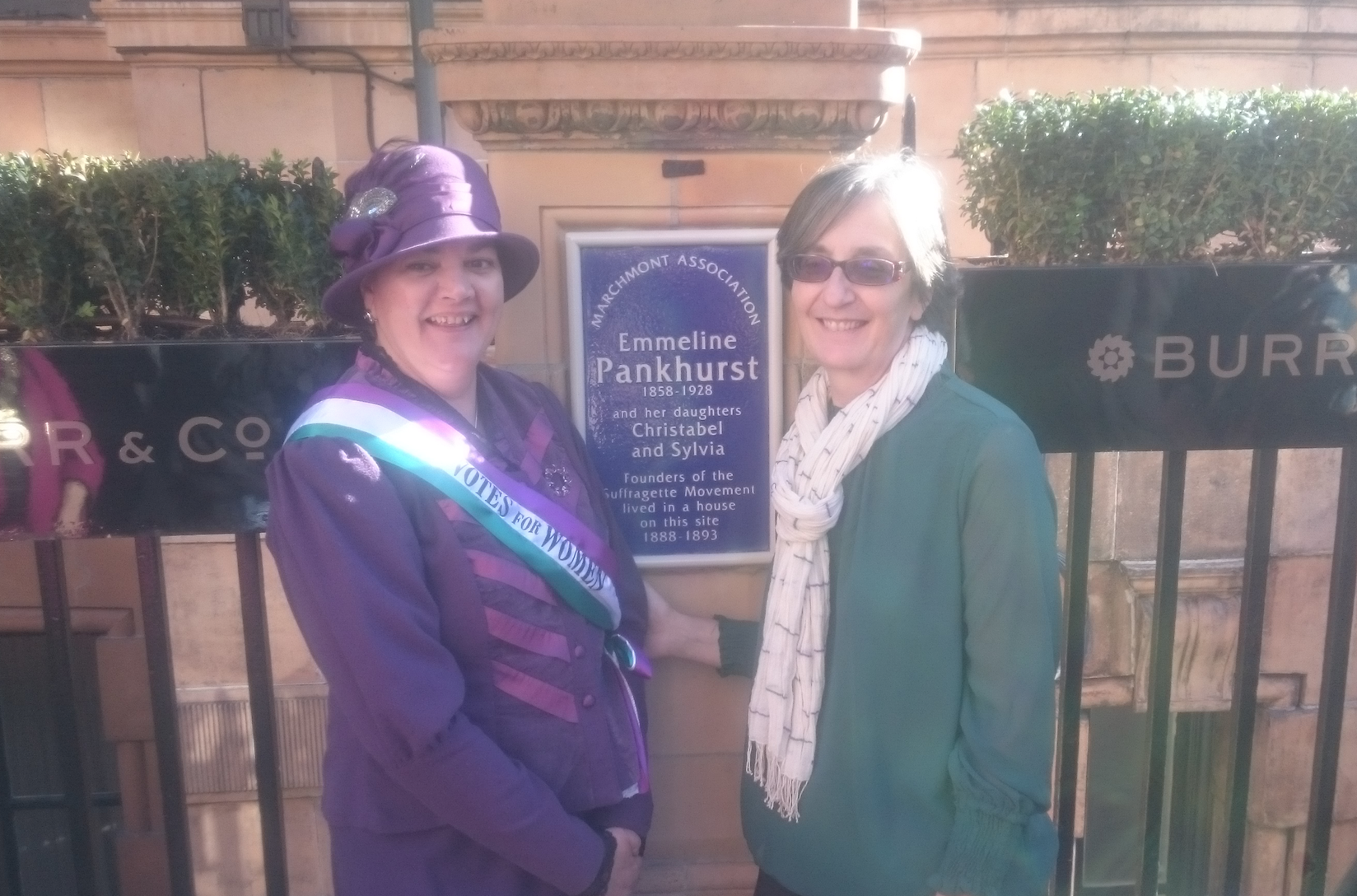
Helen Pankhurst at the unveiling of a plaque to her grandmother in Russell Square with Caroline Persaud of the Marhmont Association
“SOME people say that the lives of working women are too hard and their education too small for them to become a powerful voice in winning the vote. Such people have forgotten their history.”
The words of Sylvia Pankhurst, who was tortured in Holloway prison for her activism, and served more prison sentences than any other suffragette.
When I ask her granddaughter, Helen Pankhurst, to describe Sylvia, she smiles and takes a deep breath; “she was a suffragette socialist anti-fascist pan-Africanist freedom fighter and Ethiopian patriot.”
But Helen Pankhurst does not rest on the laurels of her name.
She is the founder of Centenary Action, a cross-party coalition of campaigns aimed at encouraging more women to enter the political sphere.
The unifying principle is the two centenaries: partial suffrage in 1918 and full suffrage in 1928.
Centenary Action launched in 2018 and hopes by 2028 to have achieved, in Helen’s words, “equal and diverse representation and to have addressed the obstacles in our parliament that stop women entering and staying in politics.”
The Pankhurst family – who lived in Russell Square – split over Sylvia’s intersectional and class-based approach to social justice, leaving Pankhursts on both sides of the political spectrum.
This division is what Centenary Action, as a cross-party effort, seeks to overcome.
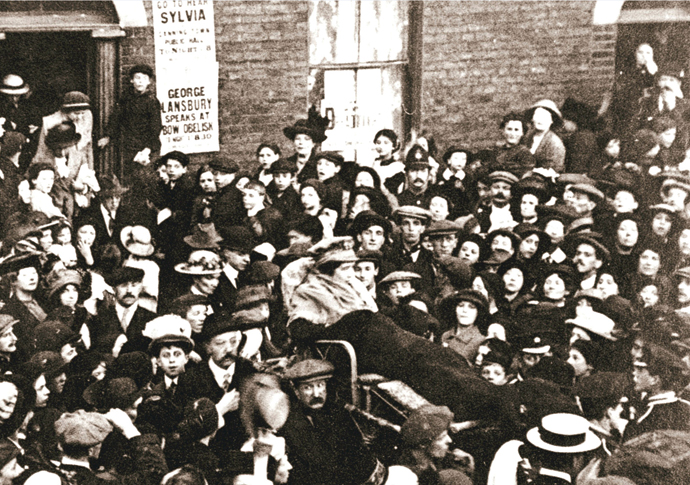
Sylvia Pankhurst carried by her supporters
“So much of politics is about schisms along party lines,” Helen says.
“Emmeline ended up a conservative and Sylvia began and remained a socialist, but we believe that there’s a need for feminism across party lines.”
So does more women in politics mean better outcomes for all? Not everyone thinks so – Liz Truss was opposed to quotas and “women’s policies.”
But a study by the UCL Constitution Unit shows that diversity in government has two benefits, firstly it widens the scope of debate to include “policies on specific groups in society, such as single mothers, rural families or people with disabilities.”
Secondly it reduces public disengagement. The study found that women are more likely to base their arguments on lived experience; be more focused on “issues and policies, and are less adversarial.”
That means less of the off-putting bellowing and jeering.
Helen is animated on the subject: “A more representative government would make social care a higher priority. The Ministry of Health was created in 1929, one year after full suffrage, which is no coincidence!
“Sylvia Pankhurst campaigned for a national health service that finally became a reality in 1948. So we know that women’s leadership and activism brings benefits for everybody.”
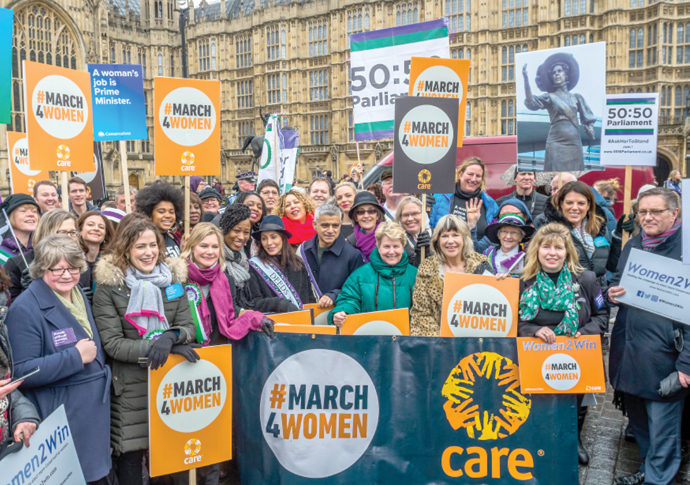
March 4 Women in London
Others go further. Rebekah Diski of the Women’s Budget Group argues that a greater focus on social care also addresses the climate crisis, pointing out that “the average job in health and care produces 1,500 times less greenhouse gas emissions than a job in the oil and gas industry.”
Does it matter which women, is it meaningful to lump them all together?
In answer Centenary Action draws from the most under-represented groups. For example 18 per cent of working age adults are d/Deaf and Disabled, but only five MPs are Disabled.
Their research shows that it costs a candidate an average of £11,118 to contest an election, and that it takes women, on average, three times as long to be elected as men.
And according to the Centenary Action report into overcoming barriers to disabled women’s involvement in politics, for disabled people this cost is even higher.
Centring marginalised voices pays off, says Helen: “Take our partnership with the Muslim Women’s Network, their distinctive voice strengthened our strategic thinking, and Shahista Gohir is now a cross-bench peer in the House of Lords. Many of our members also go on to become councillors and MPs.”
It’s important to note that politics does not only mean Westminster.
As the Islington Tribune knows so well, politics begins in our own neighbourhoods.
Centenary Action has partner groups in Wales, Northern Ireland and Scotland, “and we connect activist groups tackling various forms of exclusion up and down the country,” adds Helen.
She deflects any halo effect or personal glory, and like her grandmother she is a great amplifier of other women.
Which makes it all the more delightful that her family name is emblazoned in lights across town at the Old Vic theatre.
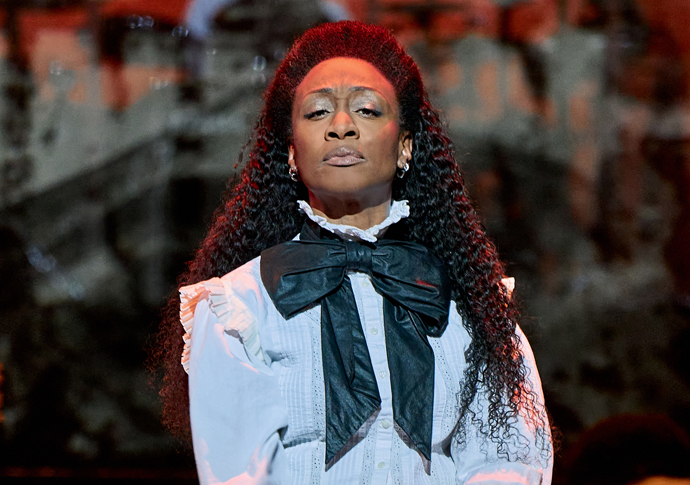
Beverley Knight is starring as Emmeline Pankhurst at the Old Vic
Sylvia – A Musical Revolution opened last month and it charts the rise of the Pankhurst family and its most notorious daughter.
Sharon Rose who plays Sylvia observed: “Sylvia is a rebel, that’s what I love about her, it wasn’t just women’s rights but Sylvia was fighting for suffrage for all, she was on the ground getting her hands dirty.”
I ask Helen what it felt like to sit in the audience of Sylvia – A Musical Revolution and see her own family portrayed onstage, in a blast of hip-hop, soul and funk, to a standing ovation.
She lights up.
“It was breathtakingly wonderful,” Helen says, adding: “The casting and the resonances, the power of the music which gives it the contemporary validity, and of course the issues are still so relevant.”
After seeing this “storm of a show” (the Guardian) last month, my friends and I got back on the Northern line and found ourselves in the middle of a carriage full of people still singing the songs and raising defiant fists in the air.
Let’s hope some of that energy translates into action; into a more diverse politics.
Because right now, UK politics does not reflect the lived experiences of the people it represents.
In Sylvia’s own words, “great is the work which remains to be accomplished”.
• Centenary Action can be found tweeting @CentenaryAction
• Sylvia: A Musical Revolution plays at the Old Vic until April 8 More: https://www.oldvictheatre.com/stage/event/sylvia
• Helen Pankhurst introduces the Feminism in Politics event at British Library, NW1, on April 27
• Recommended: Sylvia Pankhurst: Natural Born Rebel (Bloomsbury) by Rachel Holmes
Sylvia’s statue
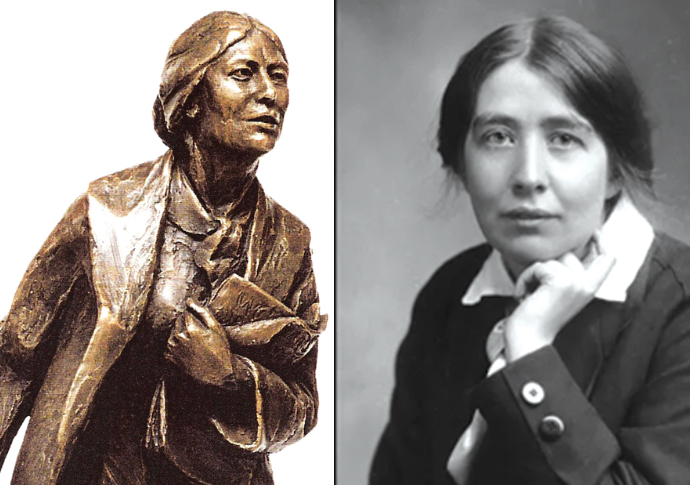
Sylvia Pankhurst, and the proposed statue of her
THIS is what an 8ft high statue of Sylvia Pankhurst will look like – if the go-ahead is given to erect it in Clerkenwell Green, writes Charlotte Chambers.
There has been debate in the Tribune’s letters pages as to whether this is the best spot for the tribute, but there is growing support to honour the resolute campaigner. It will show her “bustling towards the Marx Memorial Library” at the entrance to the square, carrying her papers and her placards.
Both her sister Christabel and mother, Emmeline, have been commemorated with statues in Westminster.
Philippa Clark, one of four members of the Sylvia Pankhurst Committee, said: “The campaign has gone on for over 20 years. It’s been something of a challenge but like Sylvia we’ve remained undaunted.
“She was more than just a votes for women campaigner, she was a hugely political figure. She and her partner Silvio were among the first to speak out against fascism in Italy.”